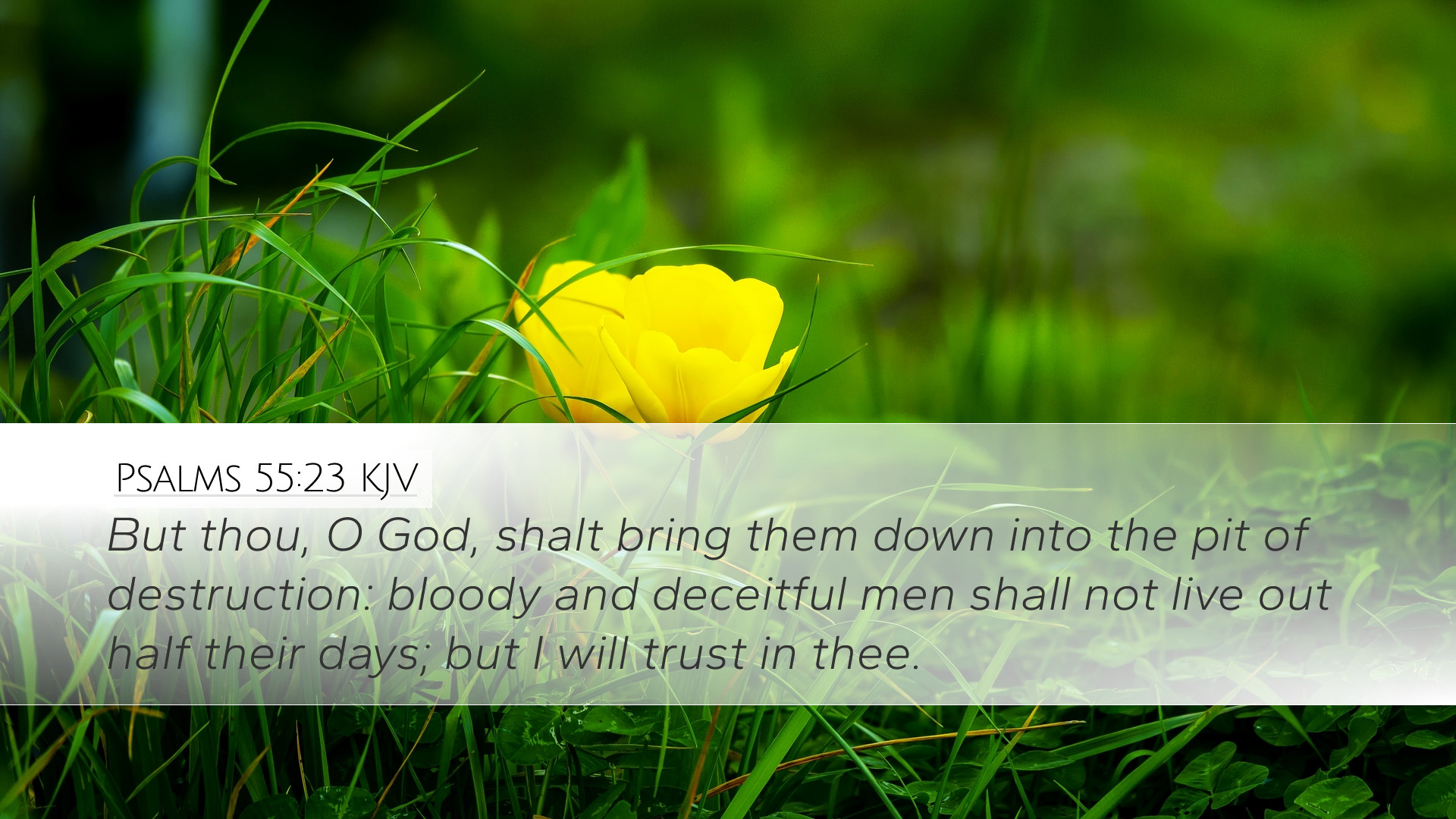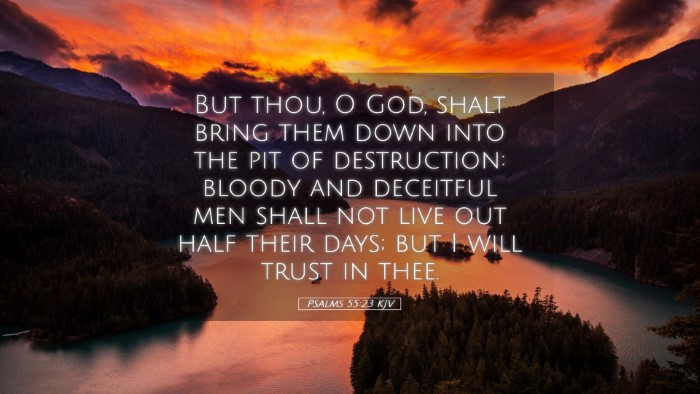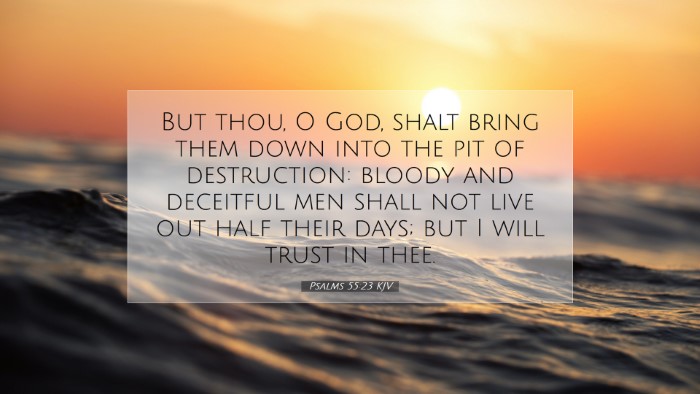Psalms 55:23 - A Commentary
Bible Verse: "But thou, O God, shalt bring them down into the pit of destruction: bloody and deceitful men shall not live out half their days; but I will trust in thee."
Introduction
The 55th Psalm reflects the anguish and betrayal experienced by David, possibly during the time of Absalom’s rebellion. In verse 23, David expresses a profound contrast between the fate of the wicked and his own trust in God. This commentary seeks to explore the implications of this verse from a theological perspective, drawing from public domain sources such as Matthew Henry, Albert Barnes, and Adam Clarke.
Contextual Background
The Psalms are a collection of songs and prayers that articulate a range of human emotions and experiences in relation to God. In Psalm 55, David laments about betrayal from someone close to him—a common experience that evokes deep feelings of sorrow and anger. This psalm offers a candid glimpse into the heart of a man seeking refuge in God amidst turmoil.
Analysis of Key Themes
1. Divine Justice
David’s declaration, "But thou, O God, shalt bring them down into the pit of destruction," underscores the theme of divine justice:
- Interpretation of "the pit": The "pit" is understood in various ways, often symbolizing death or judgment. Matthew Henry notes that it represents a place of destruction for the wicked, contrasting their demise with the faithfulness of God.
- Judgment of the Wicked: Albert Barnes emphasizes that bloody and deceitful individuals will not see long life. Their sinful actions lead to self-destruction, highlighting God’s ultimate authority over justice and morality.
- God’s Sovereignty: Adam Clarke elaborates on God's sovereignty in executing judgment. He suggests that the destruction for the wicked serves as a reminder of God's power and willingness to protect those who trust in Him.
2. The Nature of the Wicked
In this verse, David categorizes his adversaries as "bloody and deceitful men." This reflects:
- Characteristics of the Wicked: Matthew Henry highlights that such individuals exhibit violence and treachery, indicating a deliberate choice to harm others. This characterization serves as a moral warning about the nature of such enemies.
- Temporal Consequences: Barnes points out that their deceitful and bloody nature will lead to their downfall, stating that their days are numbered and they will not endure the consequences of their actions.
- Implications for Believers: Clarke remarks on the encouragement this provides to the faithful. Believers are promised vindication, reminding them that God's judgment includes both immediate and eschatological dimensions.
3. The Response of the Righteous
In stark contrast to the fate of the wicked, David concludes with a personal affirmation: "but I will trust in thee." This highlights several important aspects:
- Faith in Adversity: Matthew Henry notes that even amid distress and betrayal, a believer’s confidence in God remains unshaken. Trust is not merely passive; it is an active reliance on God's faithfulness.
- The Assurance of God’s Presence: Barnes suggests that the assurance of God’s protection allows believers to withstand the trials imposed by the wicked. This personal declaration reinforces the need for an unwavering faith amidst external chaos.
- Hope in God’s Promises: Clarke emphasizes that this trust is rooted in the hope of God’s promises. It is not blind faith, but one grounded in the historical and covenantal faithfulness of God.
Theological Implications
This verse encapsulates profound theological insights regarding the nature of God, justice, and human response. The dual themes of trust and judgment resonate through Christian doctrine:
- God’s Just Character: The affirmation of God’s commitment to justice serves as a foundation for understanding His righteous character. This is essential for pastoral counseling, offering assurance to those affected by injustice.
- The Role of Trust: For theologians, the emphasis on trust in God introduces discussions about faith in hardship and the believer’s response to evil in the world. The balance between lament and trust is a crucial aspect of Christian spirituality.
- Eschatological Promise: The verse alludes to an eschatological hope where ultimate justice will be realized. This has implications for Christian eschatology, encouraging believers to hold fast to their faith regardless of present circumstances.
Practical Applications
For pastors, students, and theologians, Psalm 55:23 serves as a rich source for practical and inspirational implications:
- Preaching on Justice: Sermons can be centered on the nature of divine justice and the importance of trusting God during times of persecution or betrayal.
- Encouraging Trust: Pastoral care can focus on encouraging individuals to maintain their trust in God, reminding them that they are not alone in their struggles.
- Understanding Lament: Integrating this verse into discussions about lament can help in addressing the painful realities many face while affirming faith.
- Emphasis on Accountability: The verse can also foster discussions on personal conduct and accountability in the light of God's judgment, challenging believers to live righteously.
Conclusion
Psalms 55:23 is a poignant reminder of God's justice amidst human betrayal. As believers, we are called to navigate the complexities of life with trust and faith, assured that God’s judgment is both severe for the wicked and restorative for the faithful. This commentary synthesizes insights from revered public domain sources, providing a framework for understanding this powerful verse in its historical, theological, and practical dimensions.


